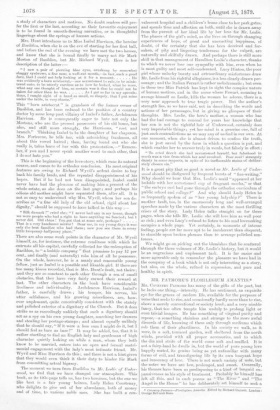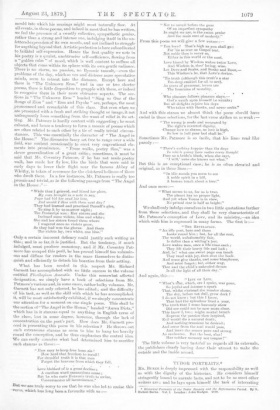MR. PATMORE'S FLORILEGIUM AMANTIS.*
Me. COVENTRY PATMORE has many of the gifts of the poet, but he lacks one thing,—intensity. He has sentiment, an exquisite eye for the graces of modern life, available for the purposes of verse that seeks to rise, and occasionally hardly more than to rise, above a merely conventional or society level ; and a very nimble fancy, that too often tempts him unduly to prolong light or even trivial images. He has something of virginal purity and repose,--a something stainless and strange to the more awful discords of life, knowing of them only through mediums which rob them of their ghastliness. In his society we walk, as it were, in a soft, terraced garden, well sheltered from the north winds, provided with all proper accessories, and to which the din and strife of the world come soft and muffled. It is not a fairy-land he dwells iu, but the world of pure young love happily mated, its genius being us yet unfamiliar with many forms of evil, and transfiguring life by its own buoyant hope and innocency of love. There is not much variety of note, but the notes we have are low, prolonged, and sweet. Generally, his themes have been as predisposing to a kind of languid ex- pansiveness as his style of treatment. Probably he himself has felt all this, and in such poems as "The River" and "The Angel in the House" he has deliberately set himself to seek a
• Coventry Patmore—Florileyium Amanlie. Edited by Bioherd Garnett. London: George Bell and Sons.
mould into which his musings might most naturally flow. At all events, in these, poems, and indeed in most that he has written,
we feel the presence of a sweetly reflective, sympathetic genius, Rather than a strong and intense one, indulging itself in the un- fettered expression of its ow,n moods, and not inclined to struggle for anything beyond that. Artistic perfection is here subordinated to faithful self-expression. Hence the first quality we note in his poetry is a quaint, unobtrusive self-sufficience, flowing from a "golden calm " of mood, which is well content to suffuse all objects that come within its sphere with its own gentle radiance. There is no storm, no passion, no Byronic tumult—even the problems of the day, which so vex and distress more speculative minds, seem to retreat into the distance. Except here and there in " The Unknown Eros," and in one or two shorter'
poems, there is little disposition to grapple with them, or indeed to recognise them in their more obtrusive aspects. The sec- tions in " The Unknown Eros " headed " Sing us One of the Songs of Zion " and " Eros and Psyche " are, perhaps, the most pronounced and remarkable of this class. But even when we
are presented with a fresh and striking thought or image, it not unfrequently loses something from. the want of relief in its set- ting. Mr. Patmore is hardly content with suggesting ; he must exhaust, and hence a tendency to form a mosaic of poems which are often related to each other by a tie of really trivial circum- stances. This was essentially the character of " The Angel iu the House." The discursive fancy sot free to range over a wide field, was content occasionally to erect very co4ventional ele- ments into prominence. " Prose walks, poetry flies," was a clever generalisation of a great critic ; sometimes, it must be said that Mr. Coventry Patmore, if he has not made poetry walk, has made her fly low, like the birds that were said in early days to lower their flight near the famous Abbey of Whitby, in token of reverence for the cloistered holiness of those who dwelt there. In a few instances, Mr. Patmore is really too prosaic and trivial, as in the following passage from " The Angel in the House :"—
"Y,Ifbile thus I grieved, and kissed her glove, My man brought in a note to say,
Papa had bid her send his love, And would I dine with them next day ?
They had learned and practised Purcell's glee, To sing it by to-morrow night ; The Postscript was : Her sisters and she Inclosed some violets, blue and white; She and her sisters found them where I wagered once no violets grew. So they had won the.gloves. And there
Tho violets lay, two white, one blue."
Only a certain innocent delicacy could justify such writing as this ; and in so far, it is justified. But the tendency, if much indulged, must produce monotony, and if Mr. Coventry Pat- more has escaped. this peril, he has proved himself too volumin- ous and diffuse for readers in the mass themselves to distin- guish and efficiently to detach his beauties from their setting.
What has been needed in this respect Mr. Richard Garnett has accomplished with no little success in the volume entitled Florilegium, Amantis. Under this somewhat affected designation, we simply have a book of selections from Mr. Patmore's various and, in some cases, rather bulky volumes. Mr. Garnett has not only selected, he has edited ; and the difficulty
of his task, as well as the skill with which he has accomplished it, will be most satisfactorily exhibited., if we simply concentrate
our attention for a moment on one single poem. This shall be the section of " The Angel in the House," headed "Aurea Dicta," -which has in it stanzas equal to anything in English verse of the class, lost in some degree, however, through the lack of
concentration on the poet's part. How does Mr. Garnett pro- ceed in presenting this poem in his selection ? He throws out such extraneous stanzas as seem to him to hang too heavily round the conception, and he thus emphasises the central idea.
We can easily conceive what had determined him to sacrifice such stanzas as these "how easy to keep free from sin ! How hard that freedom to recall ! For drepdful truth it is that men Forgot the heavens from which they fell.
Love blabbed of is a greet docline ; A careless word unsanetions sense ; But he who casts Heaven's truth to swine, Consummates all incontinence."
But Nve are truly sorry to see that he was also led to excise this verse, which has long been a favourite with
" Not to unveil before the gaze Of an imperfect sympathy In aught we are, is the sweet praise Arid the main sum of modesty."
From this poem we will give a few verses - " You level' That's high as you. shall go ; For 'tis as true as Gospel text, Not noble then is ;lover so, Either in this world or the next.
Love kissed by Wisdom wakes twice Love, And Wisdom is, thro' loving, wise. Lot Dove and Snake, and Snake and Dove,-- This Wisdom's be, that Love's device.
'Tis truth (although this truth's a star
Too deep .onskied for all to see), As poets of grammar, lovers are The fountains of morality.
•
Who pleasure follows pleasure slays,—
Cod's wrath upon himself be wreaks; But all delights rejoice his days Who takes with thanks, and never seeks."
Aud with this stanza we almost think the poem should. have ended in these selections, for the last verse strikes us as weak:—
"The wrong is made and measured by Tho right's inverted dignity. Change love to shame, as love is high, So low in hell your bed shall be."
Sometimes Mr. Patmore is so facile„ that his lines read like parody :— "There's nothing happier than the days
In whi-h young Love makes every thought Pure as a bride's blush, when she says, unto she knows nut what."
But this is an exceptional case ; he is as often elevated and original, as in these lines :— " In idle moods you seem to see A noble spirit in a hill, A human touch about a tree."
And once more :-
"What seems to us, for us is true. The planet has uo proper light, And yet when Venus is in view, No primal star is half so bright."
We Shall only indulge ourselves in two little quotations further hum these selections, and they shall be very characteristic of Mr. Patmore's conception of Love, and its ministry,--an idea which with him is expressed in many forms. The first is :—
" THE REVELATION.
"An idle poet, here and there Looks mend him ; but, for all the rest, The world, unfathotnably fair, Is duller than a witlieg's jest. Love wakes men, once a life-time each ; They lift their heavy lids and look ; And, lo ! what one sweet page can teach They read with joy, then shut the book. And some give thanks, and some blaspheme, And meet forget ; but, either way, That and the child's unheeded dream Is all the light of all their day."
A nd again, this :—
t LIFE OF LIFE,
"What's ttat, which, ere I spako, was gone, So joyfuLand intense a spark
That, whilst ,3!elelead the wonder Shona,
The day, before not dull, grow dark P
I da not know ; but this I know,
That had the splendour lived a year, The truth that I some heavenly show Did see could not bo now more clear. This know I, too; might mortal breath Express the passion then inspired, Evil would die a natural death, And nothing transient be desired;
And error from the soul would pass,
And leave the senses pure and strong As sunbeams. But the best, alas! Has neither memory nor tongue l" The little volume is very tasteful:as regards all its externals, the publishers clearly having done their utmost to make the outside and the inside accord.































 Previous page
Previous page